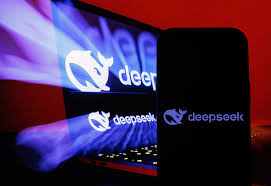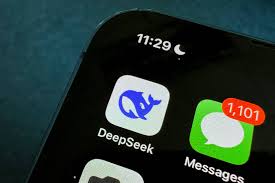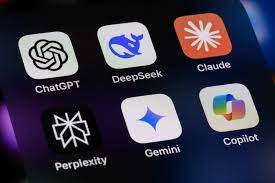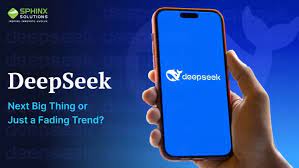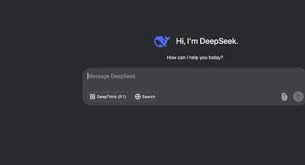🖼️ DeepSeek Image Upload Support Explained: From Vision Models to Multimodal Apps
📘 Introduction
In the world of generative AI, multimodal intelligence — the fusion of text, image, audio, and video — has become the new frontier. As OpenAI, Google DeepMind, and Anthropic push toward versatile AI models, China’s DeepSeek is emerging as a formidable contender.
One of the most exciting features of DeepSeek's ecosystem is its image upload and vision processing capability, also known as DeepSeek-Vision. This feature enables users to interact with DeepSeek by uploading images and asking questions about their content — a capability with massive implications across industries.
In this article, we’ll dive into the architecture, use cases, technical setup, and best practices for leveraging image upload support in DeepSeek’s ecosystem — both for developers and end-users.
✅ Table of Contents
What Is DeepSeek-Vision?
How Image Upload Works in DeepSeek
Supported Image Formats and Input Types
Understanding the Vision Model (Architecture & Capabilities)
Use Cases of Image Upload in AI
Sample Applications: Chatbot, OCR, Diagnosis
DeepSeek-Vision API Integration Guide
Building an App: Upload and Analyze Image
Comparison with OpenAI GPT-4-Vision
Privacy and Security Considerations
Limitations and Current Challenges
Future of Image Upload in DeepSeek
Final Thoughts + Best Practices
1. 🔍 What Is DeepSeek-Vision?
DeepSeek-Vision is the visual understanding component within the DeepSeek AI model ecosystem. Just like OpenAI’s GPT-4-Vision, DeepSeek-Vision allows users to:
Upload images
Ask questions about what's inside them
Receive descriptive, analytical, or even creative responses
Perform multimodal reasoning: combining image and text contexts
2. 🧾 How Image Upload Works in DeepSeek
At its core, image upload with DeepSeek involves:
Client-side UI where the user uploads an image
Backend API that handles preprocessing, encoding, and sending to DeepSeek
DeepSeek’s multimodal transformer processes the image embedding along with textual prompts
The model responds with a textual output, possibly enriched with visual insights
Example Flow:
plaintext User → Upload Image → Ask: "What is this machine?" → DeepSeek-Vision → "This appears to be an MRI scanner."
3. 🖼️ Supported Image Formats and Input Types
DeepSeek supports most common image types:
| Format | Supported? |
|---|---|
| PNG | ✅ Yes |
| JPG/JPEG | ✅ Yes |
| WebP | ✅ Yes |
| SVG | ❌ No |
| HEIC | 🔄 Partial |
| GIF | ✅ (static only) |
Resolution: Up to 1024x1024 recommended
Size: Max ~5MB per image (current SDK limit)
4. 🧠 Understanding the Vision Model
DeepSeek-Vision is powered by a Vision Transformer (ViT) integrated into a Mixture-of-Experts (MoE) architecture.
Key Capabilities:
Image classification
Visual question answering (VQA)
Captioning
Layout and object understanding
OCR-like tasks
Scene detection
Internally, images are transformed into embedding patches, just like language tokens. This allows the model to "read" image and text together in a unified attention space.
5. 💼 Use Cases of Image Upload in AI
| Industry | Application |
|---|---|
| E-commerce | Product recognition, image search |
| Education | Diagram analysis, handwritten notes |
| Medicine | X-ray interpretation, image triage |
| Real Estate | House listing parsing, blueprint reading |
| Manufacturing | Machine identification, defect detection |
| Legal | Document layout and stamp validation |
6. 🧪 Sample Applications
6.1 Visual Chatbot
A chatbot that supports both text and image input:
plaintext User: [uploads a picture of a weird bug] User: “What species is this?” DeepSeek: “This resembles a Cicada, commonly found in summer regions.”
6.2 OCR and Form Parsing
DeepSeek-Vision can extract structured content from documents:
plaintext User: [uploads scanned receipt] DeepSeek: “Total: $67.89, Date: June 20, 2025, Vendor: Starbucks”
6.3 Medical Imaging
Though not certified for diagnostics, DeepSeek can help:
plaintext User: [uploads chest X-ray] DeepSeek: “The image shows a likely case of pneumonia in the right lung.”
7. ⚙️ DeepSeek-Vision API Integration
Let’s look at how to integrate image upload using a Python backend.
Requirements:
bash pip install requests Pillow
Sample Code (Python):
python
import requestsfrom PIL
import Imageimport base64import io# Convert image to base64def image_to_base64(image_path): with open(image_path, "rb") as img: return base64.b64encode(img.read()).decode("utf-8")
payload = { "prompt": "What is shown in this image?", "image_base64": image_to_base64("photo.jpg"), "model": "deepseek-vision-v1",
}
res = requests.post("https://api.deepseek.com/v1/vision", json=payload)print(res.json()["response"])
8. 💻 Building a Frontend App
You can build an app using:
Streamlit:
python
import streamlit as stfrom PIL import Image
st.title("DeepSeek-Vision App")
image = st.file_uploader("Upload an image")if image:
st.image(image)
prompt = st.text_input("Ask something about this image:")
if st.button("Analyze"): # Send to FastAPI or
st.write("Analyzing...")
Flask + React or Next.js
Use Flask to proxy the DeepSeek API securely and serve from a full-stack UI.
9. ⚔️ Comparison with GPT-4-Vision
| Feature | DeepSeek-Vision | GPT-4-Vision |
|---|---|---|
| Launch Year | 2024 | 2023 |
| Input Size | ~5MB | ~20MB |
| Document OCR | ✅ Good | ✅ Excellent |
| API Access | ✅ Via Key | ✅ OpenAI Key |
| Captioning | ✅ Yes | ✅ Yes |
| Medical Use | 🚫 Research only | 🚫 Research only |
| Cost | ✅ Lower | ❌ Higher |
10. 🔐 Privacy and Security
DeepSeek claims data is anonymized and stored only for debugging (optional toggle)
Avoid uploading confidential documents unless encryption is added
Self-hosted inference is possible for enterprise clients
11. ⚠️ Limitations and Current Challenges
Can’t handle very high-resolution photos
Limited understanding of abstract artwork
Struggles with dense mathematical notation
Lacks multi-image comparison (as of July 2025)
Some answers are hallucinated (e.g., mislabeling rare species)
12. 🔮 Future of Image Upload in DeepSeek
Expected upgrades:
DeepSeek-Vision v2 with better multimodal attention
Support for video frame-by-frame analysis
Live camera integration
Integration with RAG + Vision, enabling document-aware QA
Industry-specific fine-tuning for healthcare, logistics, and finance
13. ✅ Final Thoughts + Best Practices
The arrival of DeepSeek’s image upload capability is a major milestone for Chinese AI, proving that multimodal intelligence is no longer limited to Silicon Valley labs.
Best Practices:
Resize images before upload (~512x512 is ideal)
Add descriptive prompts: “Analyze this invoice for date + amount”
Use alongside a knowledge base (RAG) for deeper answers
Enable user consent notices for uploads in production apps
Cache image embeddings for performance optimization
📦 Bonus: Template GitHub Repo
Would you like a GitHub starter repo with:
Streamlit frontend
FastAPI backend
DeepSeek-Vision API wrapper
Docker deployment
Let me know and I’ll generate it for you!


